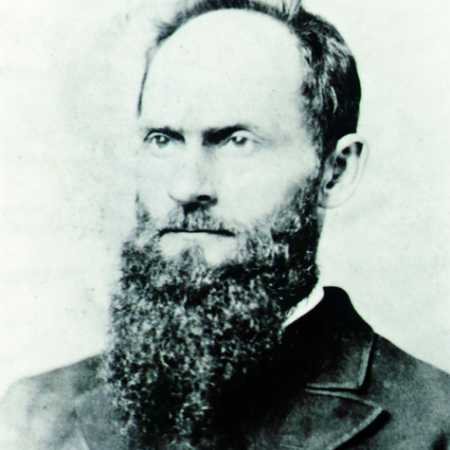In his last inspirational and informative article on influential Scots in Church History and Missions for 2024, Paul James-Griffiths of Christian Heritage Edinburgh, writes, “It’s about an extraordinary Scottish missionary who pioneered at least 60 churches in Taiwan, a college which became a university and a theological training college, and a hospital, among other things. Wow!”

Although George Leslie Mackay (1844-1901) was born in Ontario, Canada, and was later sent to Taiwan by the Canadian Presbyterian Mission in 1871, his parents were both Scottish. They had come to Canada as refugees, fleeing from the cruel Highland Clearances in Sutherland in 1830. The British government’s strategy of seeking to improve the financial productivity of agriculture in the Highlands to feed a growing population, meant that small holders were asked to leave, or were driven out of their homes, to make way for the landlords’ big agricultural enterprise. There were two main phases of clearances: between 1760 and 1815, and between 1815-1820, until the 1850s. Some of those who had to leave their homes ended up trying to eek out a living on the coast, or in towns and cities; others, like George Mackay’s parents, sought to start a new life abroad.
George Mackay was well-trained in three nations: Knox College in Toronto; Princeton Theological Seminary in the USA; and New College in Edinburgh. After spending time with Dr James Laidlaw Maxwell, the Scottish medical missionary in Taiwan, he arrived at Tamsui in northern Formosa in 1872, where he pioneered a thriving mission during his 29-year ministry there.
Mackay’s ancestry proved to be a bridge to the Kavalan people to whom he went with the message of the good news of Christ, as well as his ability to quickly master Taiwanese. He discovered a people who had been broken by the Chinese, who had acted in a similar way to the government of his own Scottish people during the Highland Clearances. Misery, poverty and despair were rank among the Kavalan who had lost everything, and who were living as refugees. Mackay described the beliefs of the Kavalan at this period as being “a potpourri of Confucian morality, Buddhistic idolatry, and Tauistic [Taoistic] demonolatry”. These religious ideas had been forced on them by the Chinese overlords, covering over their own native paganism. When they heard the gospel of redemption, hope and new life in Christ, they were bristling with joy and received the gospel readily. Mackay reported in 1883: “There are 36 villages of Pe-po-hoan (civilized aborigines) … Fully one thousand (1000) have thrown away their idols and wish to be taught Christianity… I never passed through such an experience.”
The gospel of freedom and salvation spread from village to village leading to thousands of conversions. The pattern seemed to be the same: they rejected their idols and requested to know about Jesus Christ and to be taught God’s way. Many of the Kavalan were so grateful to Mackay that they adopted the Taiwanese surname “Kai” to commemorate him; this practice still occurs today in some families. Mackay was overwhelmed that God had prepared these people for such a time of harvest.
Mackay realised that the new believers needed to be taught well, so that native leaders could be raised up to shepherd their own people. When he died in 1901, he left behind at least 60 churches under local leadership. In 1882 he pioneered the Oxford College in Tamsui to educate student men, and also the Girls’ School. The Oxford College would become the foundation for both the Aletheia University and the Taiwan Seminary to train up church leaders. He was so industrious that he also founded a small hospital in Taipei in 1880/82, called the Hobe Hospital. Today, this is named Mackay Memorial Hospital, which is a leading medical centre in Taiwan. The hospital holds fast to its Christian ethos and this year won the “2024 Happy Enterprise” Gold Award in Biotechnology and Medical Category. The hospital is in four campuses in Taiwan (Taipei, Hsinchu, Hualien, and Taitung), and has almost 3,500 beds altogether, with 8,800 employees. In 2016, the Mackay Memorial Hospital provided outpatient services for about 372,000 people every month. It has some of the best-equipped intensive care units and specialist wards in Taiwan.
Mackay’s love for the Taiwanese people inspired him to collect national artefacts, which are today housed in the Aletheia University Museum and in the Royal Ontario Museum in Canada. He was also a champion for human rights and democracy. In turn, the Taiwanese have honoured him, so that in 2008 the Taiwanese government invested in their nation’s first grand opera, with the National Symphony Orchestra, based on George Mackay’s life, called Mackay: The Black-Bearded Bible Man.
George Mackay died of throat cancer in 1901 and was buried in Tamsui, Taiwan.
